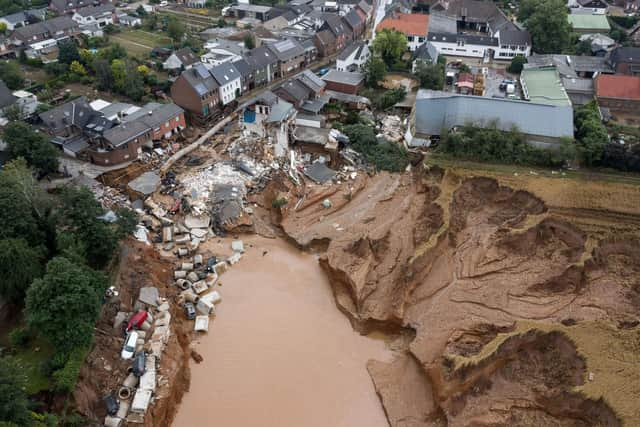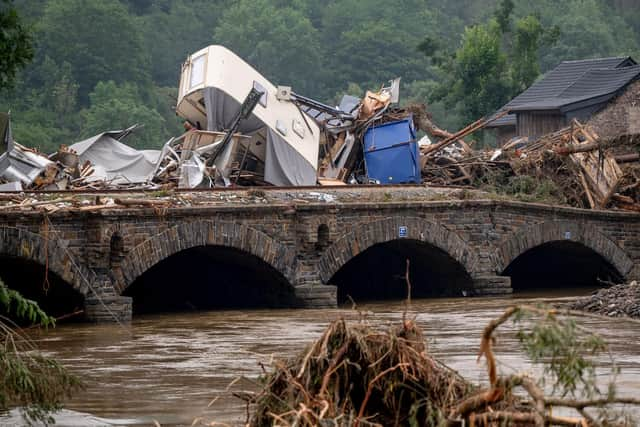Climate change: Scotland's disempowered councils seem too weak to take real action on global warming unlike their German counterparts – Joyce McMillan
I once visited the beautiful little town of Ahrweiler, to attend a peace conference at the local college; only 20 miles or so from Bonn, it seemed the very epitome of the stable, almost sleepy atmosphere of peace, and of serious cultivation of democratic institutions, painstakingly built up in that part of Germany after the Second World War.
It was therefore a tremendous, traumatic shock when the valley was blasted apart, on the evening of 14 July 2021, by huge, uncontainable torrents of flood-water that swept away hundreds of buildings, and killed 130 people.
Advertisement
Hide AdAdvertisement
Hide AdGermany is a wealthy country, of course, and huge reconstruction funds were immediately put in place; but given the likely link between climate change and what scientists call “the growing frequency and intensity of torrential rainfall”, climate activists in the area also saw an opportunity to “build back better”, by changing the energy system of the valley for good.
Their aim is to make the Ahr valley what they call a “Sol-ahr” valley, a model community with its own renewables-based and locally run energy system; and in doing so, they are not only working through Germany’s existing strong layers of local democracy, but also becoming increasingly aware of the radical nature of renewable energy itself.
Renewables, after all, are by definition available almost everywhere, in wind, waves, water and sunlight; and – if kept in community ownership – can help disperse and redistribute power in ways we may find hard to imagine, after centuries of increasingly centralised energy systems based on the ownership, transporting and burning of fossil fuels.
We could, in other words – if we can move fast enough – be living at the dawn of a whole new age of local governance and autonomy, based on a radically transformed and decentralised energy system.


Yet huge though these potentials are, they often seem a world away from a Scottish local election process battered by years of disempowerment of the nation’s local authorities, and led by national politicians whose focus is anything but local. The last time Scotland went to the polls in a local election, in May 2017, turnout shot up from a typically dismal 39.6 per cent in 2012, to a slightly more healthy looking 47 per cent.
The bad news, though, was that this increase in participation was apparently driven not at all by local issues, but by the general increase in engagement with politics following the 2014 independence referendum campaign; and the main driver of higher turnout seemed to come from supporters of the Union determined both to vote against the SNP, and to concentrate their vote on the Conservatives.
And the chances are that when this week’s results emerge, the polarised pattern will be the same; in the main, voters will either vote SNP, or – if they are unionists who have now had enough of Boris Johnson and his party – for those parties that might give the Union a more acceptable face, in future national elections.
None of this means, of course, that Scottish local authorities are completely powerless, or that voters are not interested in the issues they tackle. On the contrary, there’s barely a citizen of Edinburgh, for example, who could not deliver a one-hour lecture on the mishandling of the current tram works, or the dead hand of Airbnb currently destroying the community life of city centre areas.


Advertisement
Hide AdAdvertisement
Hide AdAnd beyond that, many local authorities are genuinely ambitious for the future of their communities, eager to play their part in tackling climate change and building a sustainable future.
Yet despite the powers councils still have, and the genuine dedication and ambition of many councillors and officials, something seems broken, in the connection between Scotland’s councils and the sheer transformative potential of this moment. Perhaps it’s the dominance of an increasingly polarised and media-driven national party politics in local councils which work best without such tribalism.
Perhaps it’s simply that our councils – still hopelessly disempowered and unreformed, in what is surely the SNP’s biggest real failure in government since 2007 – no longer have the power, or the money, to take the kinds of major initiatives that might be truly transformative.
As many have argued, today’s 32 Scottish authorities are poor, battered things compared to their predecessors, often too big to be truly local, too small to be strategic, and exhausted by their ‘austerity’ role in implementing central government policy without the resources to do it well.
Whatever the cause, though, here I sit in my Edinburgh flat, looking at election literature which – even in its more local moments – seems largely unaware of the crucial role local communities will have to play in the economic transformation that must come.
In a city of tenement flats both posh and humble, there is – for example – no mention of any large-scale scheme to encourage me and my neighbours to hoist an array of solar panels onto our shared roof; far less a radical plan for an Edinburgh powered by its own energy, and building a future as a true home of 21st century enlightenment.
Perhaps we are waiting for central governments to live up to their rhetoric, and provide the money, pass the legislation, institute the schemes that need to start today, in order to give us hope for tomorrow.
Yet as one Ahr valley activist put it, we really no longer have time to wait; and local and community government – as it is now, or as we remake it for the future – is where we have to start, in beginning to do it for ourselves.
Comments
Want to join the conversation? Please or to comment on this article.

